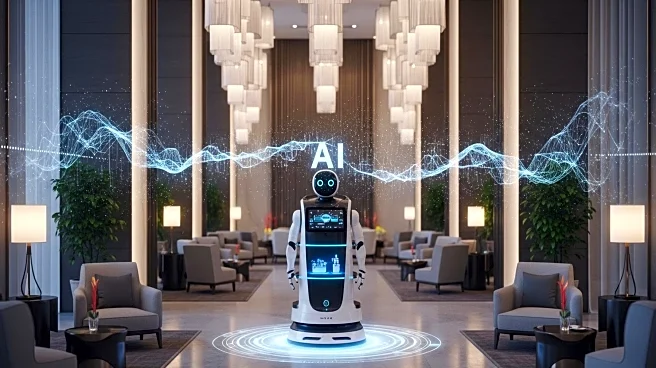What's Happening?
The Destination AI Conference for Hoteliers, held in Washington DC, focused on the transformative potential of artificial intelligence (AI) within the hospitality industry. Attendees, including Stephanie Smith from Cogwheel, discussed the need to move beyond the hype surrounding AI and focus on practical applications that address real business challenges. Key areas identified for AI impact include guest engagement, revenue growth, and operational efficiency. The conference emphasized the importance of integrating AI into existing systems to enhance customer experiences and streamline operations. Despite the industry's technological lag, consumer adoption of AI in travel planning is significantly ahead, suggesting a need for the industry to align with consumer trends.
Why It's Important?
The integration of AI in the hospitality sector is crucial as it promises to revolutionize how hotels operate and interact with guests. By leveraging AI, hotels can enhance guest experiences through personalized services and efficient operations, potentially increasing customer satisfaction and loyalty. The industry's ability to adapt to AI-driven changes could lead to significant competitive advantages, particularly in reclaiming market share from online travel agencies. However, the successful implementation of AI requires a cultural shift within organizations, emphasizing the need for upskilling employees and fostering an AI-first mindset. This transition could redefine the hospitality landscape, impacting employment, service delivery, and business models.
What's Next?
The hospitality industry is expected to continue exploring AI applications, with a focus on creating seamless and personalized guest experiences. Hotels may need to invest in data standardization and system integration to fully leverage AI capabilities. As AI technology evolves, the industry will likely see increased automation in areas such as booking processes and customer service. The shift towards AI-driven operations may also prompt regulatory considerations regarding data privacy and employment practices. Stakeholders, including hotel chains and technology providers, will need to collaborate to address these challenges and capitalize on AI's potential benefits.
Beyond the Headlines
The adoption of AI in hospitality raises ethical and cultural considerations, particularly concerning data privacy and the potential displacement of human workers. As AI systems become more integrated into hotel operations, ensuring transparency and accountability in AI decision-making processes will be essential. Additionally, the industry's reliance on AI could lead to a reevaluation of the human touch in hospitality, balancing technological efficiency with personalized service. Long-term, the successful integration of AI could drive innovation and sustainability within the industry, aligning with broader societal goals of technological advancement and environmental responsibility.










